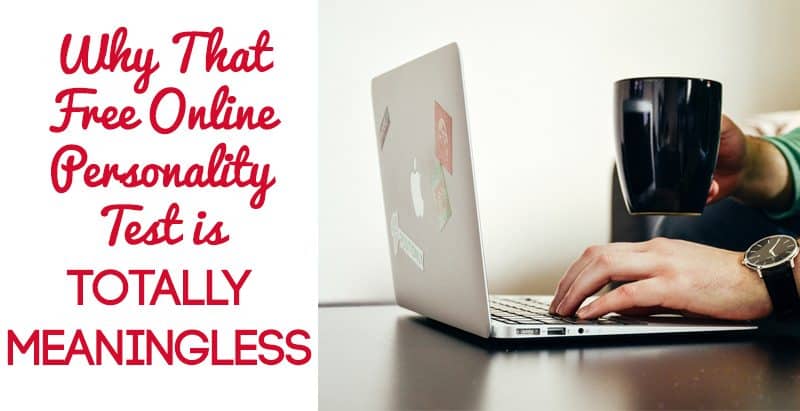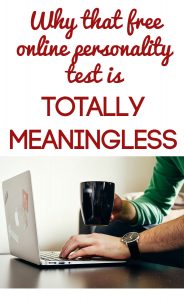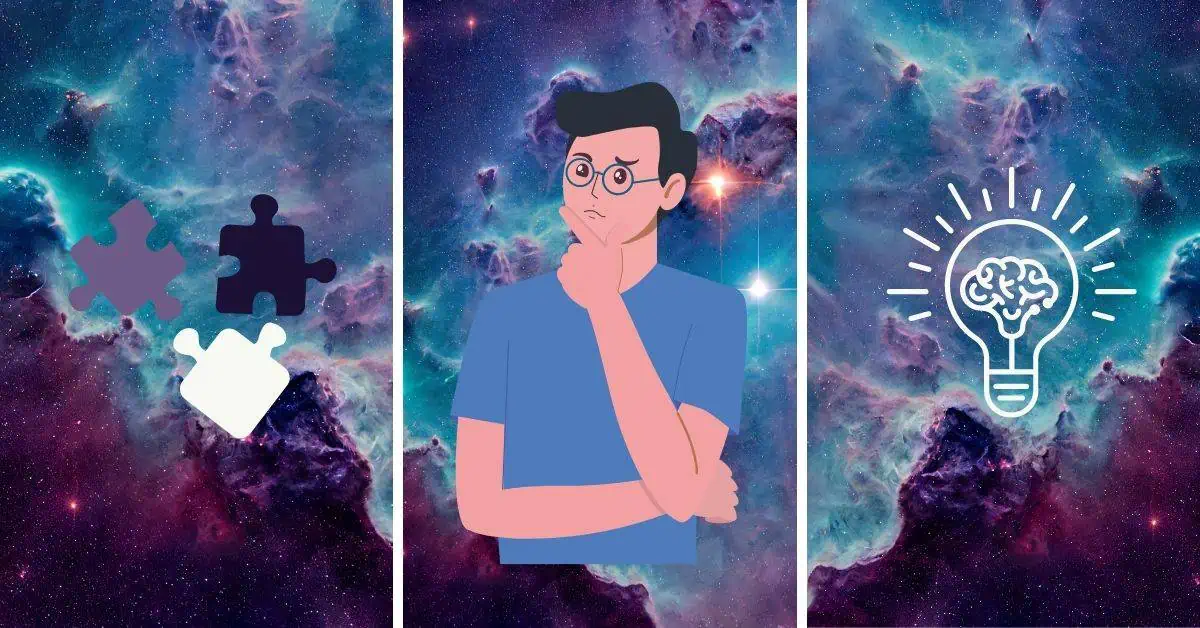Why That Free Online Personality Test is Totally Meaningless
There are two popular articles floating around online called “Why the Myers-Briggs® Test is Totally Meaningless”, and “Goodbye to the MBTI, the Fad That Won’t Die.”
I’ve read both articles a number of times, and am always amused by the huge lack of effort they took to understand the MBTI®. The articles ridicule the MBTI assessment, saying that it classifies people as pure introverts or pure extroverts, feelers or thinkers. However, the Myers-Briggs assessment denies anyone being a pure extrovert or introvert. The MBTI® does tell you if you prefer extroversion over introversion, but that you have two introverted and two extroverted functions (thus, really implying that all of us are a form of ambivert). The MBTI® also says that all of us use thinking and feeling, we just prefer one over the other. Carl Jung himself, whose study on psychological type is the basis for the MBTI®, did not believe in a pure introvert or extrovert. He said “there is no such thing as a pure extravert or a pure introvert. Such a man would be in the lunatic asylum.” It appears that neither of the authors of these articles did any in-depth research concerning the test, the strict validity testing that has been performed over the last five decades, or any research into the cognitive functions which form the underlying basis of the Myers-Briggs® assessment.

That brings me to my next subject. While I’m a big supporter of the Myers-Briggs® psychometric assessment, I have absolutely zero faith in the free online tests very loosely resembling the MBTI®. Over the last decade, a plethora of copycat personality tests have arisen all across the internet. These tests don’t claim to have undergone any reliability or validity tests, and they don’t consider the underlying cognitive functions that are a vital part of determining true type. Yet hundreds of thousands are flocking to these tests because they’re free and they’re fun! I even relied on these tests before I took the MBTI® practitioners course. The only problem with these tests is that now we have thousands of mistyped people who are attached to the idea of a personality type that may not actually suit them. This matters because you won’t be able to get the right kind of help or advice you need for your type if you’re looking in the wrong place.
Not sure what your personality type is? Take our new personality questionnaire here. Or you can take the official MBTI® here.
Has the Myers-Briggs® Assessment Been Thoroughly Researched?
The Myers-Briggs® psychometric assessment has been through a rigorous series of reliability tests, and has been scrutinized by psychologists, social workers, neuroscientists, and teachers. If you look through the MBTI® Manual, you will see numerous tests that were administered to determine its validity and reliability. They measured test-retest scores, they adapted and re-adapted the test until it fit an incredibly high standard. They had to use responses from over 3,000 adults to decide which questions were doing the best job of sorting people into their type preferences. Mary & Isabel’s Library Online (MILO®) catalog at the Center for Applications of Psychological Type provides over 11,000 research studies on the MBTI instrument.
One book that shines a more scientific light on the validity of the Myers-Briggs® types is The Neuroscience of Personality by UCLA professor Dario Nardi. He discusses how the MBTI® and the cognitive functions correlate with brain activity. He was able to give EEG brain scans to people and map their activity to see how well it coincided with the theory of cognitive functions.
Will you find this same intense scrutiny and research applied to that ever-popular 16 Personalities test or the Human Metrics online test? These tests show no validity or reliability research; there’s no manual showing tests that have been performed to determine their accuracy. As much as these free tests can be fun, they are far less able to accurately define your type than speaking with an official MBTI® practitioner or determining your type through study.
Online Tests Can’t Replace the Personal Nature of the MBTI® Assessment
When I attended the MBTI® Practitioners Certification Program last August, I learned that as a practitioner we’re not even allowed to give out someone’s 4-letter type until we’ve sat down with them face-to-face. Only after that one-on-one conversation do we give them their type. During this conversation, we talk about each preference with the client, ask them which preference they feel they relate to more, and help clarify any questions or confusion they might have had. Sometimes this conversation causes the practitioner to change the type that the questionnaire revealed, because the indicator is only part of the process involved in typing someone. That personal conversation is a very important step that vastly reduces the number of mistyped people out there. If I were administering the MBTI® and just giving out the scores without these one-on-one conversations I would be “breaking the rules” as a practitioner.
“I’m an INFJ/ENFP/ISTJ!”
The INFJ personality type is one of the types that is most likely to be given in error from a free online test. The INFJ is one of the rarest types in the world (hence its appeal to many people), comprising less than 1% of the US population. However, when I had an ESTJ, ISFJ, ENTP, INFP, and ESFJ take the 16 Personalities test, they all got an INFJ result. My ENTP friend re-tested later and got an ENTJ result. I’ve had ESFPs get ENFP results numerous times on Human Metrics. My extremely ISTP husband never fails to get an ISTJ result from any online test. I myself have taken the test and have gotten an INFP or INFJ result every time, but it’s never the same year after year.
Blogger Heidi Priebe explains this well: “Of all the mistypes that happen between any two types in the MBTI, INFPs mistyping as INFJs is by far the most common one – and this is not necessarily the INFP’s fault. INFPs are the least stereotypically perceptive perceivers. They tend to be quite routine-oriented and not particularly spontaneous in nature – they are open-minded and explorative in their thoughts, not their actions. However, since most free online type tests measure perception based on how physically spontaneous one is or is not, almost all INFPs test as INFJs when they first take an online quiz.”
This is what happens when a personality test is introduced that hasn’t undergone numerous validity and reliability tests to make sure it’s on the right track.
This is also what happens when tests don’t take the cognitive functions into consideration. My ISTP husband shares no common cognitive functions with the ISTJ, but the free online tests don’t know that. The test just sees that my husband is ever-so-slightly organized and so it tacks on a ‘J’ to the end of his type and all is solved. He could never relate to all the articles for ISTJs when we believed that was his type. As soon as I realized he was an ISTP everything made sense and he was able to actually get something useful out of the MBTI®.
So What’s the Big Deal?
The problem with this is that when individuals are mistyped, they tend to get attached to their type and feel defensive if anyone calls it into question. Now, to be fair, it’s not really anyone’s business what someone’s type is unless that person asks for opinions. I’m not the kind of person to point fingers at all the people I feel are mistyped and tell them they’re wrong. That tends to bother people. I’m writing this post as a warning to people who might be confused about their type. I know that most of us want to know our type so we can understand ourselves better, understand others better, and get a firmer grasp of our strengths and weaknesses. It’s going to be harder for someone to do that if they’re attached to an incorrect type and finding resources for someone who is wired differently than they are.
Another problem with thousands of people being mistyped is that it changes the perception of that type throughout the community. An ENFP in a group for ENFPs surrounded by actual ESFPs, INFPs, and ENFJs might feel really confused about why they don’t fit in with all the other “ENFPs”. Heidi Priebe goes over this in her post “How Mistypes Have Warped the Descriptions of Each Intuitive MBTI Type”.
If you can’t afford to take the official MBTI® with a practitioner (I know it’s a bit pricey!), do some studying on your own! Grab a book like “Please Understand Me II” by psychologist David Keirsey, or “Gifts Differing” by Isabel Briggs-Myers. Study the cognitive functions and determine which ones you use the most. If you feel like you’re not relating to a lot of aspects of your “type” it’s very possible that you’ve been mistyped.
But My Type Is So Cool!
I know. All these types have gifts that are going to appeal to different individuals. I kind of wish I was an ISFP myself, and sometimes I get tired of being an INFJ. But each personality type is amazing! There’s not one that’s better than all the rest. We also don’t have to let our types “box us in”. I believe that sensors can be analytical and intuitives can be practical. I know that feelers can be intensely logical and thinkers can be driven by compassion. I’ve met reflective, shy extroverts and talkative introverts (albeit in a small group of close friends).
Sometimes it’s best to wipe the slate clean of letters and start over again. You’re more than a four-letter type, and if you want to learn more about how to grow and develop in your type try to take the time to make sure you’re trusting the right resources.
What Are Your Thoughts?
Do you have any insights or experiences to add? Let us know in the comments!
Find out more about your personality type in our eBooks, Discovering You: Unlocking the Power of Personality Type, The INFJ – Understanding the Mystic, and The INFP – Understanding the Dreamer. You can also connect with me via Facebook, Instagram, or Twitter!
Subscribe to Our Newsletter

Want to discover more about personality type? Get the inside scoop with Susan Storm on all things typological, along with special subscriber freebies, and discounts on new eBooks and courses! Join our newsletter today!















Thank you for this! I agree, it’s annoying that people don’t even try to understand the MBTI before criticizing it. And that everyone thinks they’re an INFJ, INTJ, etc. Although I’ve never taken the “official” test, I know based off the cognitive functions that I’m an ISTJ. And even though I used to think I was a different type (ENFJ), and sometimes act like a different type (or would rather BE a different type haha), I know that’s who I am, and I’ve learned about it thanks to books and sites like this! Also, I like the idea of having a conversation and asking the person questions before determining their type. There are a whole lot of factors that could cause someone to be mistyped, so I think that’s a great idea.
Thanks for your feedback! It’s wonderful to hear from an ISTJ and someone who has really taken the time to research their type fully! Very few people will do that. Yes, the conversation process is so important. Even the person who taught the practitioners course I took said that the MBTI® is NOT perfect. There are so many environmental factors, levels of self-knowledge, and other types of things that can create error when the indicator predicts type. This is why we always try to sit down, talk about sensing and intuition, after explaining it and maybe doing a couple of exercises, we ask the client “which do you think you prefer more?” if the client says “sensing” but the test said “intuition” we will switch it to sensing after this one-on-one consultation. We also have them read a profile for their type after this consultation and ask them if they feel it resonates fully with them. If it doesn’t, we will go back to the drawing board. I definitely think people can discover their type without this consultation, though, by doing thorough research on their own (like you have!). There are some great books out there and web site as resources to really understanding it!
The information here and the information about cognitive functions help me better understand Myers-Briggs®. I questioned why anyone should pay money to take a test that doesn’t give accurate and consistent results. Now that I learned that the free online tests very loosely resemble the Myers-Briggs® assessment which you say is valid and reliable, things are making better sense. Thanks for sharing this as I don’t see a lot of information online about this. Questions: Even if one gets consistent results taking free online tests, the results still might not be accurate right? So you cannot be an INTJ and/or INTP because of the differences in preference of cognitive functions right? Can you be considered an extrovert with a dominant introverted cognitive function? I’ve been learning the cognition functions but I’m still not sure what my type is (I think it is ISTP). Any other recommendations on how I can confirm my type without taking the official MBTI®? Is it true that you can have a dominant or auxiliary function that is not well developed or weak since Myers-Briggs® is about preferences not strengths? Will you discuss how each type use the shadow functions? What is your opinion about StrengthsFinder?
The information here and the information about cognitive functions help me better understand Myers-Briggs®. I questioned why anyone should pay money to take a test that doesn’t give accurate and consistent results. Now that I learned that the free online tests very loosely resemble the Myers-Briggs® assessment which you say is valid and reliable, things are making better sense. Thanks for sharing this as I don’t see a lot of information online about this. Questions: Even if one gets consistent results taking free online tests, the results still might not be accurate right? So you cannot be an INTJ and/or INTP because of the differences in preference of cognitive functions right? Can you be considered an extrovert with a dominant introverted cognitive function? I’ve been learning the cognition functions but I’m still not sure what my type is (I think it is ISTP). Any other recommendations on how I can confirm my type without taking the official MBTI®? Is it true that you can have a dominant or auxiliary function that is not well developed or weak since Myers-Briggs® is about preferences not strengths? Will you discuss how each type use the shadow functions? What is your opinion about StrengthsFinder?
Hi! Thank you so much for your feedback. The free online tests can point you in the right direction somewhat; I find that they usually get two letters right. (most often the E/I preference of the T/F preference). I do find that the free online tests tend to get the N/S or J/P preference wrong the most. This is why there are so many people who are unsure if they are an INTP/INTJ or INFP/INFJ or sensor or intuitive. You can definitely determine your type without taking the official Myers-Briggs® questionnaire. That’s how I determined my type, only later I confirmed it with the MBTI®. I would suggest reading the profiles of each type (http://www.myersbriggs.org/my-mbti-personality-type/mbti-basics/the-16-mbti-types.htm) and even the profiles on 16personalities are relatively accurate (just not the test). If you read the profiles and feel like you really relate to one or two of those profiles I would then look into the cognitive functions for each and see if they resonate with you. If you are an extrovert, you would not have a dominant introverted function. Even if your dominant function is weakly developed, it will nearly always be much more developed than your auxiliary, tertiary, and inferior functions. When we think of your preferences, we often think of our left and right hand. You can use both hands, but (most of us) prefer one over the other. If I try to write with my left hand my writing is very sloppy. Thus, as an intuitive if I try to use sensing, I’m bound to make more errors and blunders and not function quite as smoothly. This doesn’t mean I can’t use sensing, I just am not as proficient at it. I will be writing more about shadow functions in the future 🙂 Thanks again for commenting, please feel free to contact me with any questions! Sometimes I’m a little slow to respond because I have two other jobs and four kids, so sometimes life gets busy, but I always do try to respond as quickly as possible 🙂
When I take online tests, I tend to flip-flop between INTP and INTJ. I just about always get high I and T scores with “moderate” N scores and borderline P/J scores. When I look at the actual functions of the types it becomes pretty apparent that INTP is the only one that has the primary and secondary functions that are most like how I think.
Doing tests repeatedly reveals that the questions that are the most “sometimes yes/sometimes no” in my head have the most to do with the J/P and N/S aspects while the ones that are the most “always yes/always no” are the I/E and T/F aspects.
Due to how the personality types are often dived up (SJ, SP, NF, NT) it seems like it’s easier to confirm if you belong to the NF/NT groups as the tests do a pretty good job of figuring out if people are feelers or thinkers. Since SJ and SP groups depend on the aspects that they don’t do a good job testing for then I’d expect to find people in those groups being mistyped more often.
All that to say, reading though 16 different profiles can get confusing and it’s nice to have a way to cut that list in half even if it’s only by excluding the I/E and T/F aspects. But yeah, reading up on things is definetly the better way to go.
As an INFP, the mistyping as an INFJ is highly understandable. INFPs tend to share a lot of traits with the INFJ – such as being very vocal about their ideals (i.e., philosophies, political stand, beliefs, etc.), being unforgiving. Unfortunately, one’s set of cognitive functions is found in their shadow functions, as the INFP’s opposing Fe function prevents them to be as assertive as the INFJ, whose Fe is auxiliary.
Very informative article, I really had no idea scientists were still taking mbti seriously. I’m going to have to check out the book you mentioned. However, you don’t tell us where to get this test done if not for free online?
I’ve taken several free online tests (usually the ones that were at least over 50 questions) at different times and stages in my life and I consistently get INTJ. I’ve read the profiles of the other types and INTJ really is the only one that describes me at all. I’d be interested to know if I’ve been typed correctly (even though tbh I love being an INTJ)
Hi Heather! The best way to determine your type is through researching the types and talking the official MBTI questionnaire on their web site or with a practitioner (like me!) Also, I’ve heard from some good sources that the free test on personality hacker isn’t bad, but I haven’t tried it yet.
It is almost impossible really to make a test that could properly identify someone accurately as we often have a different idea of who we are and of course, our behaviour does not explain our motives.
I never took personality typing too seriously when I was a teenager, I just found them fun and fascinating as they tend to be correct to an extent. However when I first take the MBTI test, I was fascinated by the intricate details of each type and begin reading through. I was typed as an INFP and while a lot of things resonated with me, I also felt I am possibly an ENFP or ESFP from reading the descriptions. It took me several years of reading, observations and discussions for me to identify myself as an ENFP but even so all the tests I ever took would always place me as an INFP. Perhaps because I don’t fit into the sassy, quick tongued ENFP stereotype but how I decided to act does not at all reflect how I think.
I am 99% sure that I am an ENFP especially after comparing myself with a lot of other ENFP and INFP both in the fictional world and real life but one day once I have a stable income, I’d like to have myself formally typed by a professional. You’ll never know what surprises you may dig up about yourself in a journey of self exploration
Thanks so much for this. I’ve seen a lot of people get really confused and frustrated with the MBTI test because of the same issues you mentioned. When I first took one of the free tests I was told I was an ISFP, and the simple explanation of their stereotype seemed fitting to me. Later I took a different free version of the test and got INTJ, and this confused me because all of the stereotypes were telling me I was no longer kind and sensitive, but cold, analytical, and arrogant.
Only after I looked deeper into the MBTI and studied cognitive functions did I come to realize why INTJ was my actual type and not ISFP.
I’m so glad you enjoyed this article! Yes, the abundance of free personality tests can make deciding on your type VERY difficult! ISFPs and INTJs share the same cognitive functions, so it’s understandable that you would mistype. Glad you have found an answer though through studying the cognitive functions. I always think that’s the best way 🙂
I’ve been researching the theories of Carl Jung for several years now, and I want you to know your articles are appreciated. Thank you.